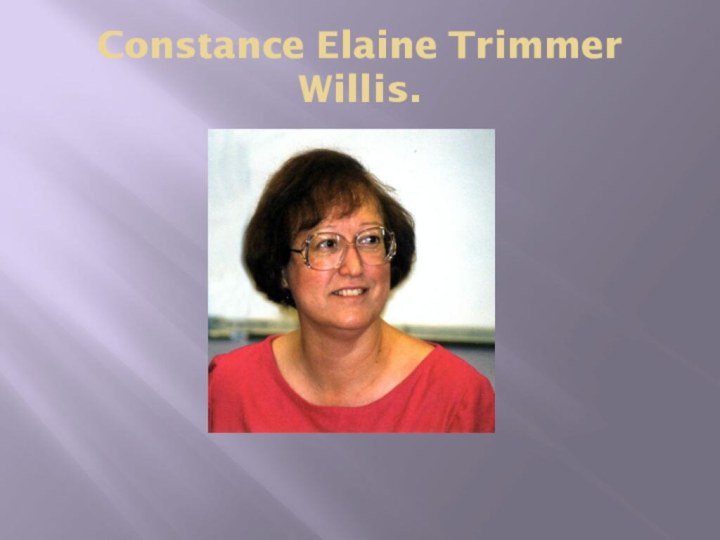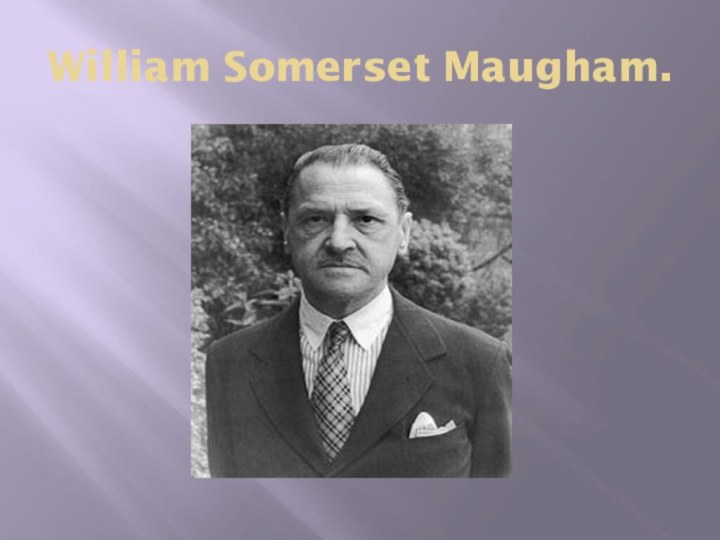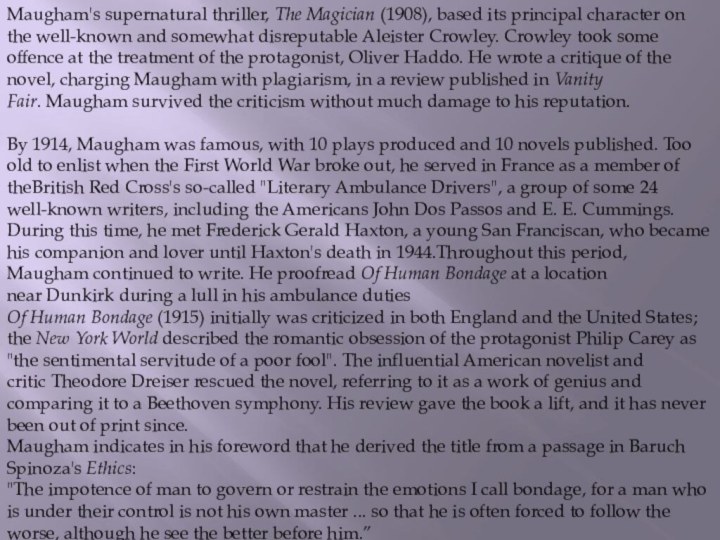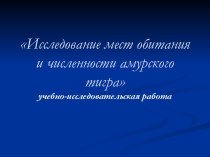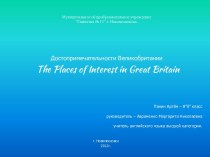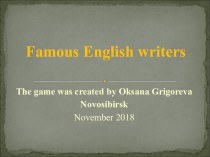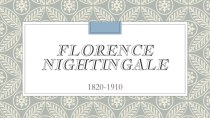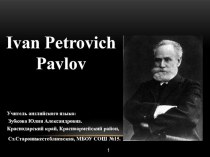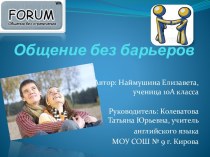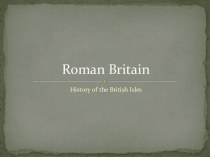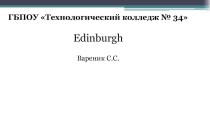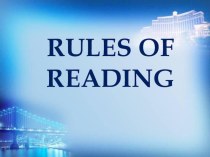Слайд 3
Eric Arthur Blair (25 June 1903 – 21 January 1950),known
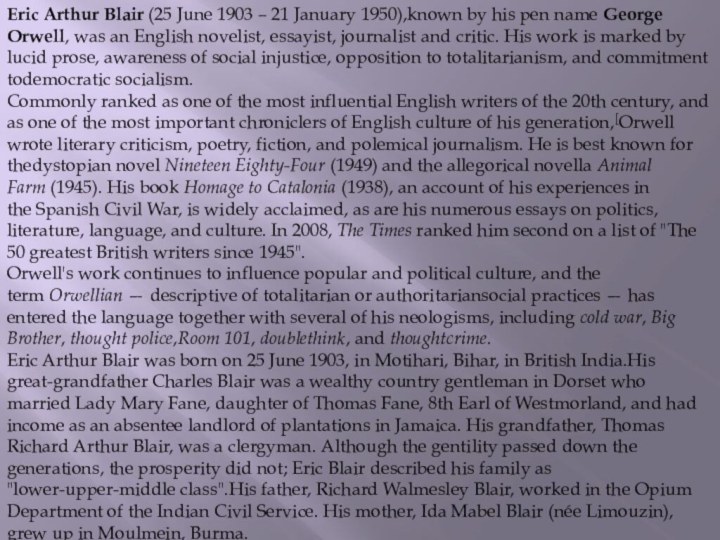
by his pen name George Orwell, was an English novelist,
essayist, journalist and critic. His work is marked by lucid prose, awareness of social injustice, opposition to totalitarianism, and commitment todemocratic socialism.
Commonly ranked as one of the most influential English writers of the 20th century, and as one of the most important chroniclers of English culture of his generation,[Orwell wrote literary criticism, poetry, fiction, and polemical journalism. He is best known for thedystopian novel Nineteen Eighty-Four (1949) and the allegorical novella Animal Farm (1945). His book Homage to Catalonia (1938), an account of his experiences in the Spanish Civil War, is widely acclaimed, as are his numerous essays on politics, literature, language, and culture. In 2008, The Times ranked him second on a list of "The 50 greatest British writers since 1945".
Orwell's work continues to influence popular and political culture, and the term Orwellian — descriptive of totalitarian or authoritariansocial practices — has entered the language together with several of his neologisms, including cold war, Big Brother, thought police,Room 101, doublethink, and thoughtcrime.
Eric Arthur Blair was born on 25 June 1903, in Motihari, Bihar, in British India.His great-grandfather Charles Blair was a wealthy country gentleman in Dorset who married Lady Mary Fane, daughter of Thomas Fane, 8th Earl of Westmorland, and had income as an absentee landlord of plantations in Jamaica. His grandfather, Thomas Richard Arthur Blair, was a clergyman. Although the gentility passed down the generations, the prosperity did not; Eric Blair described his family as "lower-upper-middle class".His father, Richard Walmesley Blair, worked in the Opium Department of the Indian Civil Service. His mother, Ida Mabel Blair (née Limouzin), grew up in Moulmein, Burma.
Слайд 4
Eric was one year old, his mother took
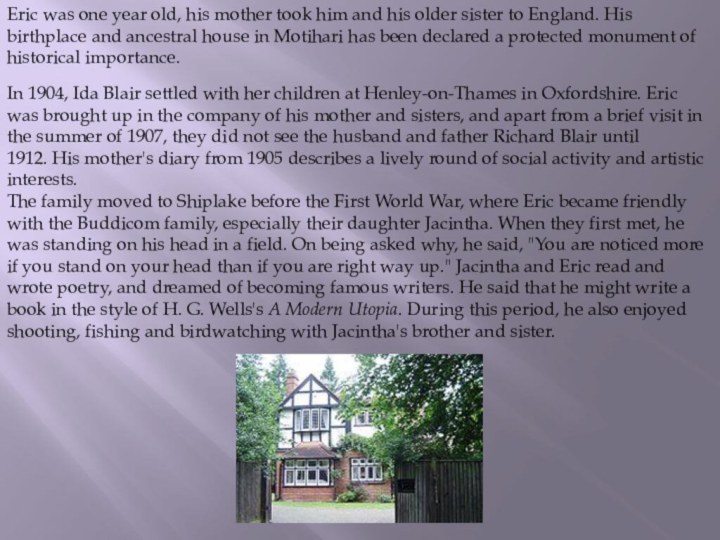
him and his older sister to England. His birthplace and
ancestral house in Motihari has been declared a protected monument of historical importance.
In 1904, Ida Blair settled with her children at Henley-on-Thames in Oxfordshire. Eric was brought up in the company of his mother and sisters, and apart from a brief visit in the summer of 1907, they did not see the husband and father Richard Blair until 1912. His mother's diary from 1905 describes a lively round of social activity and artistic interests.
The family moved to Shiplake before the First World War, where Eric became friendly with the Buddicom family, especially their daughter Jacintha. When they first met, he was standing on his head in a field. On being asked why, he said, "You are noticed more if you stand on your head than if you are right way up." Jacintha and Eric read and wrote poetry, and dreamed of becoming famous writers. He said that he might write a book in the style of H. G. Wells's A Modern Utopia. During this period, he also enjoyed shooting, fishing and birdwatching with Jacintha's brother and sister.
Слайд 5
Literary career and legacy:
During most of his career,
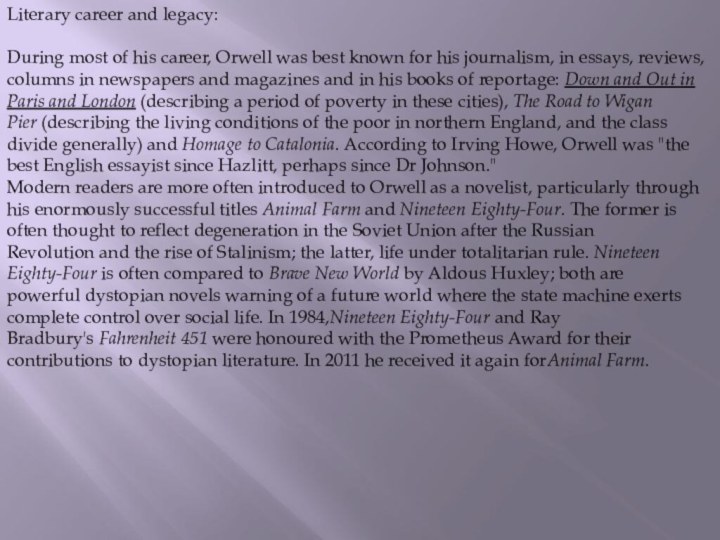
Orwell was best known for his journalism, in essays,
reviews, columns in newspapers and magazines and in his books of reportage: Down and Out in Paris and London (describing a period of poverty in these cities), The Road to Wigan Pier (describing the living conditions of the poor in northern England, and the class divide generally) and Homage to Catalonia. According to Irving Howe, Orwell was "the best English essayist since Hazlitt, perhaps since Dr Johnson."
Modern readers are more often introduced to Orwell as a novelist, particularly through his enormously successful titles Animal Farm and Nineteen Eighty-Four. The former is often thought to reflect degeneration in the Soviet Union after the Russian Revolution and the rise of Stalinism; the latter, life under totalitarian rule. Nineteen Eighty-Four is often compared to Brave New World by Aldous Huxley; both are powerful dystopian novels warning of a future world where the state machine exerts complete control over social life. In 1984,Nineteen Eighty-Four and Ray Bradbury's Fahrenheit 451 were honoured with the Prometheus Award for their contributions to dystopian literature. In 2011 he received it again forAnimal Farm.
Слайд 6
ESSE on difference between book and cartoon Orwell's

Animal Farm.
Many wondered why Orwell did not like could
not find one who would be willing to publish his work. Most likely the fact that his story is an allegorical work. These allegories are not considered, such as: animals revolt against Jones, this time like a Oktyaborskuyu Revolution. Fighting Napoleon with snow, it's like Stalin against Trotsky.
Time for publication of the book Orwell chose not suitable, because in those days of the USSR were allies of the United Kingdom, and was the fear of spoiling relations with them.
Yet Orwell had his way, and published his honor Animal Farm. Then a little later comes cartoon on this product. On the creation of the cartoon immediately began work two producer
.
I read the book, watched the cartoon and I would like to compare the book with the cartoon. And so, when you read the book, you have unwittingly imagine big picture, but looking cartoon, many of your pictures are not the same as real. In the book, in spite of the dismal, described a lot of humor in the cartoon was a lot longer stories in the book, many episodes have been removed and it was not so much humorous. And if viewed humor, in a very mild form, more similar to Disney movies. In book had a lot of offers with question and exclamation marks, it gives us the sensitivity to understand the characters, their experience in the film you do not see and you think that they relate to each other without remorse.
Слайд 7
I really liked the fact that in all
personages Stockyards voiced the same person, and he has
it worked so brilliantly that I was in shock.
After reading the book I most remember the episode where Napoleon first try alcohol, and a description of its diplomatic games with the neighboring farms. See the movie I most wanted to see those moments, but unfortunately in these cartoon episodes not.
In my opinion that the book that the film was and remains an interesting till today, many want to know the story Orwell's Animal Farm. Even in spite of the collapse of the USSR His book is still read with great interest.
Слайд 9
Father Robert, being a mining engineer, he worked
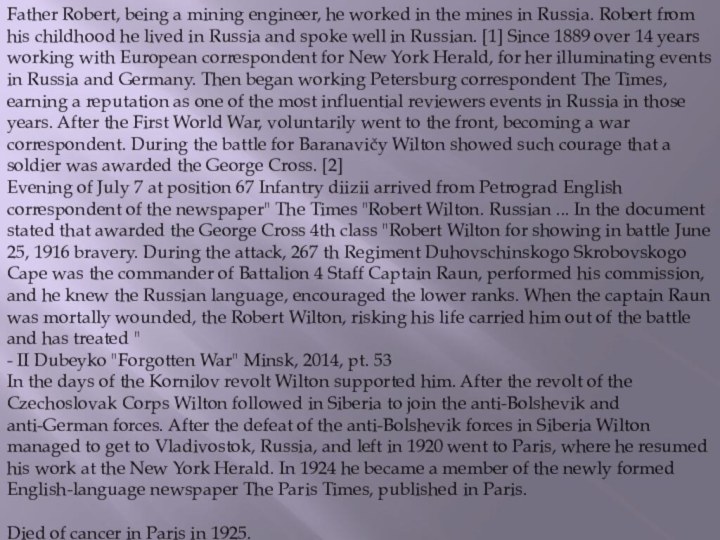
in the mines in Russia. Robert from his childhood
he lived in Russia and spoke well in Russian. [1] Since 1889 over 14 years working with European correspondent for New York Herald, for her illuminating events in Russia and Germany. Then began working Petersburg correspondent The Times, earning a reputation as one of the most influential reviewers events in Russia in those years. After the First World War, voluntarily went to the front, becoming a war correspondent. During the battle for Baranavičy Wilton showed such courage that a soldier was awarded the George Cross. [2]
Evening of July 7 at position 67 Infantry diizii arrived from Petrograd English correspondent of the newspaper" The Times "Robert Wilton. Russian ... In the document stated that awarded the George Cross 4th class "Robert Wilton for showing in battle June 25, 1916 bravery. During the attack, 267 th Regiment Duhovschinskogo Skrobovskogo Cape was the commander of Battalion 4 Staff Captain Raun, performed his commission, and he knew the Russian language, encouraged the lower ranks. When the captain Raun was mortally wounded, the Robert Wilton, risking his life carried him out of the battle and has treated "
- II Dubeyko "Forgotten War" Minsk, 2014, pt. 53
In the days of the Kornilov revolt Wilton supported him. After the revolt of the Czechoslovak Corps Wilton followed in Siberia to join the anti-Bolshevik and anti-German forces. After the defeat of the anti-Bolshevik forces in Siberia Wilton managed to get to Vladivostok, Russia, and left in 1920 went to Paris, where he resumed his work at the New York Herald. In 1924 he became a member of the newly formed English-language newspaper The Paris Times, published in Paris.
Died of cancer in Paris in 1925.
Слайд 10
Russia's Agony. - 1st. - London: Edward Arnold,
1918.
The Last Days of the Romanovs. - 1st.
- London: Thornton Butterwith, 1920.
Translations
French: in 1921 in Paris.
Russian: Wilton R. Last Days of the Romanovs / translated prince Volkonskii. - 1st. - Berlin: City of Kitezh, 1923 - Russian edition had large bills in comparison with the original English book
attributed to Wilton
Crime of the royal family, committed by the Bolsheviks and the Germans. - 1st. - Paris, 2005 - 244 p. - A book published by a Russian emigre Shota Chikovani. According to him, the Russian-language manuscript of the book, written by R. Wilton, after his death, was kept at the friend Tatiana Wilton Crown, which after ¾ of a century after the death of Wilton gave the manuscript Chikovani . In addition to text in Wilton book contains many previously unavailable Russian reader, appeals, manifestos, appeals, and other rare documents of representatives of the Russian emigration.
Слайд 11
Prison and Exile
On the day when the
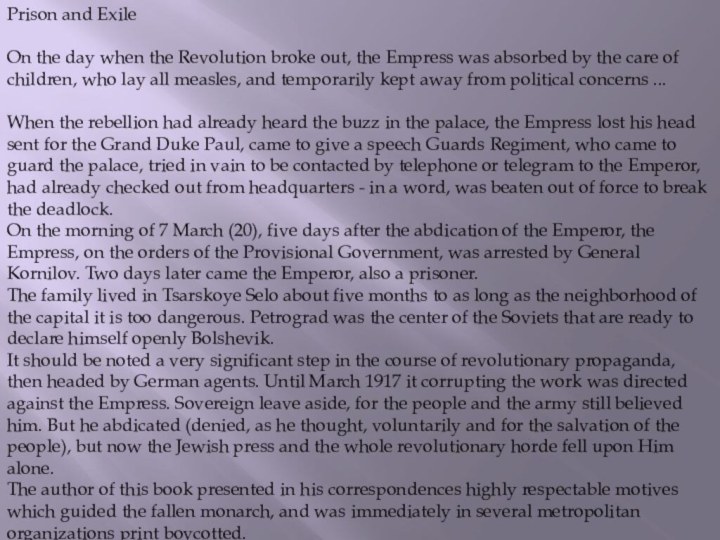
Revolution broke out, the Empress was absorbed by the
care of children, who lay all measles, and temporarily kept away from political concerns ...
When the rebellion had already heard the buzz in the palace, the Empress lost his head sent for the Grand Duke Paul, came to give a speech Guards Regiment, who came to guard the palace, tried in vain to be contacted by telephone or telegram to the Emperor, had already checked out from headquarters - in a word, was beaten out of force to break the deadlock.
On the morning of 7 March (20), five days after the abdication of the Emperor, the Empress, on the orders of the Provisional Government, was arrested by General Kornilov. Two days later came the Emperor, also a prisoner.
The family lived in Tsarskoye Selo about five months to as long as the neighborhood of the capital it is too dangerous. Petrograd was the center of the Soviets that are ready to declare himself openly Bolshevik.
It should be noted a very significant step in the course of revolutionary propaganda, then headed by German agents. Until March 1917 it corrupting the work was directed against the Empress. Sovereign leave aside, for the people and the army still believed him. But he abdicated (denied, as he thought, voluntarily and for the salvation of the people), but now the Jewish press and the whole revolutionary horde fell upon Him alone.
The author of this book presented in his correspondences highly respectable motives which guided the fallen monarch, and was immediately in several metropolitan organizations print boycotted.
Слайд 12
Cities, Rural Lands, filled with echoes of the

army, these vile accusations. "He's a traitor!" - Shouted
Leninist comrades; "He's a traitor!" - Repeated ridiculous "parliament"; "He's a traitor!" - Yelled Kerensky and Tips. And the crowd, insulted in his patriotism, was indignant. For Nicholas II was worse than death. He proved it later, He preferred death to dishonor. The Allies knew, however, that the accusation is false. A question was raised about the provision of the Emperor and his family asylum in England. The plan failed, and in Tsarskoye Cele chests were re-laid, the unfortunate prisoners were deprived of this latter method of salvation. Miliukov intercepted a telegram addressed to King George Emperor, invited him to England, the same Miliukov, who was the instigator of the Duma attacks on the Empress. The delay of this telegram and led to the abandonment of the Royal Family to leave Russia. Of course, the pain caused by these low suspicions, overpowered all other burdens of imprisonment, of which a comprehensive and historically accurate story can be found in the detailed testimony of the palace commandant Colonel Kobylinsky and GG Gilliard and Gibbs.
All the letters, all the files have been dug in the hope of finding the slightest trace of treason. During this work, spouses have been separated, as is done with common scams.
Kerensky, much can be forgiven for his behavior after the investigation. He brought national repentance, solemnly declaring: "The king is pure." From revolutionary Minister such an act required some courage. [14]
Unfortunately, the protection of soldiers and even officers behaved not so well. Kerensky exhorted them, but in vain, the habit has already been absorbed. Military aides Minister Guchkov allowed themselves to cry persons who lived in the palace: "You are all corrupt." Soldiers who took away his toys Cesarevitch killed his goats, stealing things and generally prisoners behaved louts deserve much less censure.
Слайд 14
Doris May Lessing (English. Doris May Lessing; nee
Taylor, October 22, 1919, Kermanshah - November 17, 2013,
London) - British science fiction writer, winner of the Nobel Prize for Literature in 2007, the wording "tells about the experience of women with skepticism, passion and visionary force exposed consideration is divided civilization. "Former communist and supporter of Sufism, Lessing adhered ideas of feminism.
Author 5 novels from the series "Canopus in Argos" (1979-1982), containing different interpretations of philosophical problems of passive participation of weak humanity against powerful civilizations. When positive review of Brian Aldiss series has been criticized for the use of the concept of alien gods. Since 1965, the regularly published a monograph on the work of Lessing.
Слайд 15
Doris Mae Taylor was born on October 22,
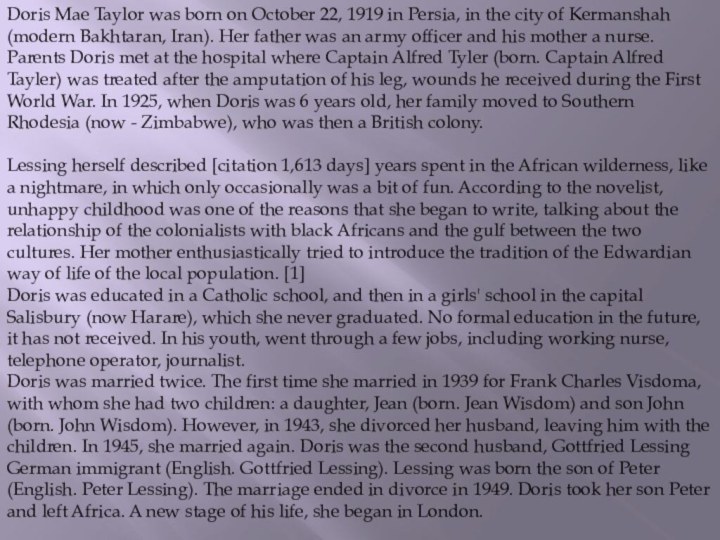
1919 in Persia, in the city of Kermanshah (modern
Bakhtaran, Iran). Her father was an army officer and his mother a nurse. Parents Doris met at the hospital where Captain Alfred Tyler (born. Captain Alfred Tayler) was treated after the amputation of his leg, wounds he received during the First World War. In 1925, when Doris was 6 years old, her family moved to Southern Rhodesia (now - Zimbabwe), who was then a British colony.
Lessing herself described [citation 1,613 days] years spent in the African wilderness, like a nightmare, in which only occasionally was a bit of fun. According to the novelist, unhappy childhood was one of the reasons that she began to write, talking about the relationship of the colonialists with black Africans and the gulf between the two cultures. Her mother enthusiastically tried to introduce the tradition of the Edwardian way of life of the local population. [1]
Doris was educated in a Catholic school, and then in a girls' school in the capital Salisbury (now Harare), which she never graduated. No formal education in the future, it has not received. In his youth, went through a few jobs, including working nurse, telephone operator, journalist.
Doris was married twice. The first time she married in 1939 for Frank Charles Visdoma, with whom she had two children: a daughter, Jean (born. Jean Wisdom) and son John (born. John Wisdom). However, in 1943, she divorced her husband, leaving him with the children. In 1945, she married again. Doris was the second husband, Gottfried Lessing German immigrant (English. Gottfried Lessing). Lessing was born the son of Peter (English. Peter Lessing). The marriage ended in divorce in 1949. Doris took her son Peter and left Africa. A new stage of his life, she began in London.
Слайд 16
In the 1950s and 1960s, Doris Lessing joined
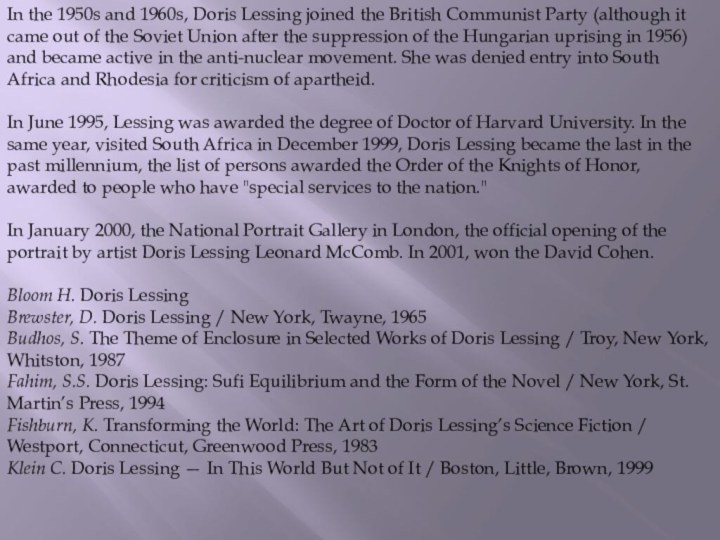
the British Communist Party (although it came out of
the Soviet Union after the suppression of the Hungarian uprising in 1956) and became active in the anti-nuclear movement. She was denied entry into South Africa and Rhodesia for criticism of apartheid.
In June 1995, Lessing was awarded the degree of Doctor of Harvard University. In the same year, visited South Africa in December 1999, Doris Lessing became the last in the past millennium, the list of persons awarded the Order of the Knights of Honor, awarded to people who have "special services to the nation."
In January 2000, the National Portrait Gallery in London, the official opening of the portrait by artist Doris Lessing Leonard McComb. In 2001, won the David Cohen.
Bloom H. Doris Lessing
Brewster, D. Doris Lessing / New York, Twayne, 1965
Budhos, S. The Theme of Enclosure in Selected Works of Doris Lessing / Troy, New York, Whitston, 1987
Fahim, S.S. Doris Lessing: Sufi Equilibrium and the Form of the Novel / New York, St. Martin’s Press, 1994
Fishburn, K. Transforming the World: The Art of Doris Lessing’s Science Fiction / Westport, Connecticut, Greenwood Press, 1983
Klein C. Doris Lessing — In This World But Not of It / Boston, Little, Brown, 1999
Слайд 18
Sir Arthur Igneyshus (in outdated transmission - Ignatius)
[2] Conan Doyle [3] [To 1] (Doyle) [K 2]
(born. Sir Arthur Ignatius Conan Doyle; May 22, 1859, Edinburgh - July 7, 1930, Crowborough [en], Sussex) - English writer (doctor of Education), author of numerous adventure, historical, nonfiction, fiction and comic works. The creator of classic characters detective, science fiction, historical and adventure literature - the brilliant detective Sherlock Holmes, the eccentric Professor Challenger, the dashing cavalry officer Gerard. Since the second half of the 1910s and the end of life - an active supporter and advocate ideas of spiritualism.
Слайд 19
Arthur Conan Doyle was born in a family
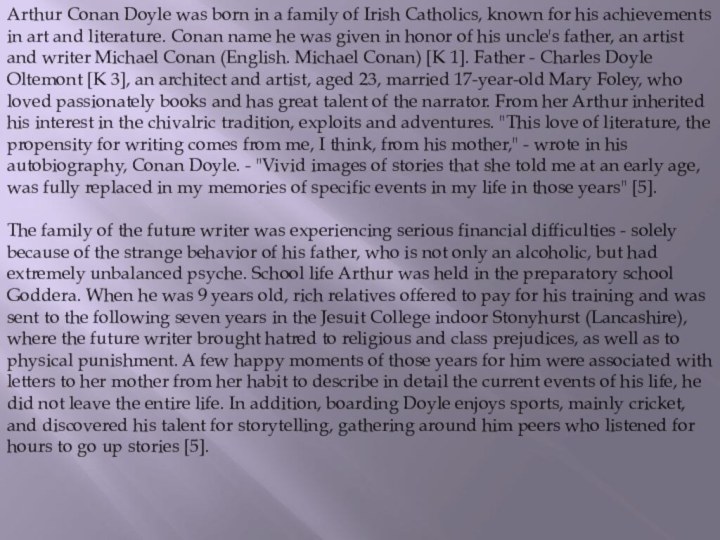
of Irish Catholics, known for his achievements in art
and literature. Conan name he was given in honor of his uncle's father, an artist and writer Michael Conan (English. Michael Conan) [K 1]. Father - Charles Doyle Oltemont [K 3], an architect and artist, aged 23, married 17-year-old Mary Foley, who loved passionately books and has great talent of the narrator. From her Arthur inherited his interest in the chivalric tradition, exploits and adventures. "This love of literature, the propensity for writing comes from me, I think, from his mother," - wrote in his autobiography, Conan Doyle. - "Vivid images of stories that she told me at an early age, was fully replaced in my memories of specific events in my life in those years" [5].
The family of the future writer was experiencing serious financial difficulties - solely because of the strange behavior of his father, who is not only an alcoholic, but had extremely unbalanced psyche. School life Arthur was held in the preparatory school Goddera. When he was 9 years old, rich relatives offered to pay for his training and was sent to the following seven years in the Jesuit College indoor Stonyhurst (Lancashire), where the future writer brought hatred to religious and class prejudices, as well as to physical punishment. A few happy moments of those years for him were associated with letters to her mother from her habit to describe in detail the current events of his life, he did not leave the entire life. In addition, boarding Doyle enjoys sports, mainly cricket, and discovered his talent for storytelling, gathering around him peers who listened for hours to go up stories [5].
Слайд 20
In 1876, Arthur graduated from college and returned
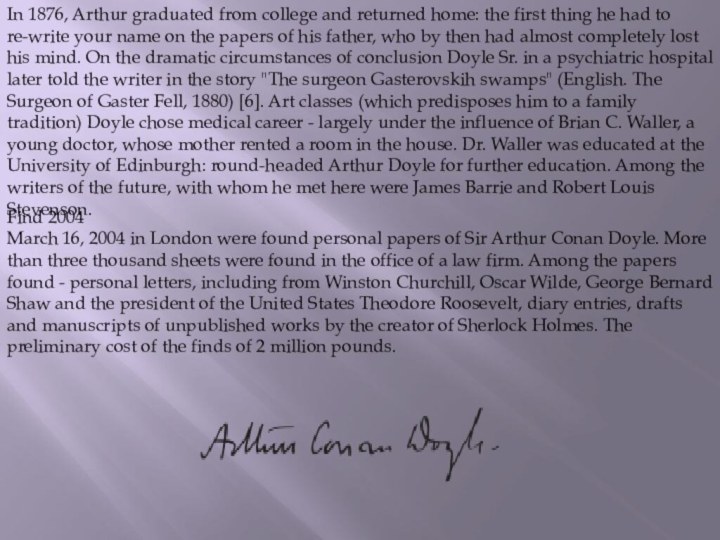
home: the first thing he had to re-write your
name on the papers of his father, who by then had almost completely lost his mind. On the dramatic circumstances of conclusion Doyle Sr. in a psychiatric hospital later told the writer in the story "The surgeon Gasterovskih swamps" (English. The Surgeon of Gaster Fell, 1880) [6]. Art classes (which predisposes him to a family tradition) Doyle chose medical career - largely under the influence of Brian C. Waller, a young doctor, whose mother rented a room in the house. Dr. Waller was educated at the University of Edinburgh: round-headed Arthur Doyle for further education. Among the writers of the future, with whom he met here were James Barrie and Robert Louis Stevenson.
Find 2004
March 16, 2004 in London were found personal papers of Sir Arthur Conan Doyle. More than three thousand sheets were found in the office of a law firm. Among the papers found - personal letters, including from Winston Churchill, Oscar Wilde, George Bernard Shaw and the president of the United States Theodore Roosevelt, diary entries, drafts and manuscripts of unpublished works by the creator of Sherlock Holmes. The preliminary cost of the finds of 2 million pounds.
Слайд 21
screen versions of
"Lost World" (Silent Film Harry
Hoyt, 1925)
The Lost World (1998)
and others. -
see. Lost World.
Main article: List of films about Sherlock Holmes
In the American film cycle "The Adventures of Sherlock Holmes" with Basil Rathbone and Nigel Bruce, filmed in 1939-1946 years, got 14 films, the first of which was the "Hound of the Baskervilles."
In the Soviet TV series "The Adventures of Sherlock Holmes and Dr. Watson" (1979-1986) with Vasily Livanov and Vitaly Solomin starring out the following movies:
Sherlock Holmes and Dr. Watson
The Adventures of Sherlock Holmes and Dr. Watson
The Adventures of Sherlock Holmes and Dr. Watson: The Hound of the Baskervilles
The Adventures of Sherlock Holmes and Dr. Watson: The Treasures of Agra
The Adventures of Sherlock Holmes and Dr. Watson: The twentieth century begins
Слайд 22
Constance Elaine Trimmer Willis.
Слайд 23
Constance Elaine Trimmer Willis (born December 31, 1945) is
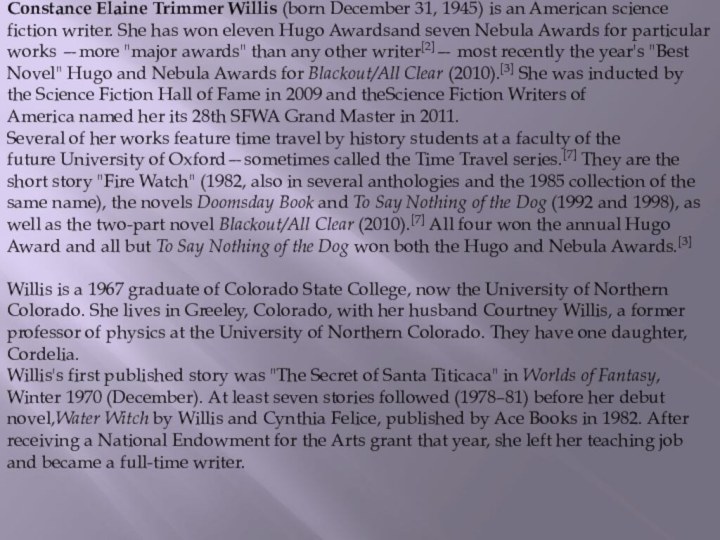
an American science fiction writer. She has won eleven Hugo
Awardsand seven Nebula Awards for particular works —more "major awards" than any other writer[2]— most recently the year's "Best Novel" Hugo and Nebula Awards for Blackout/All Clear (2010).[3] She was inducted by the Science Fiction Hall of Fame in 2009 and theScience Fiction Writers of America named her its 28th SFWA Grand Master in 2011.
Several of her works feature time travel by history students at a faculty of the future University of Oxford—sometimes called the Time Travel series.[7] They are the short story "Fire Watch" (1982, also in several anthologies and the 1985 collection of the same name), the novels Doomsday Book and To Say Nothing of the Dog (1992 and 1998), as well as the two-part novel Blackout/All Clear (2010).[7] All four won the annual Hugo Award and all but To Say Nothing of the Dog won both the Hugo and Nebula Awards.[3]
Willis is a 1967 graduate of Colorado State College, now the University of Northern Colorado. She lives in Greeley, Colorado, with her husband Courtney Willis, a former professor of physics at the University of Northern Colorado. They have one daughter, Cordelia.
Willis's first published story was "The Secret of Santa Titicaca" in Worlds of Fantasy, Winter 1970 (December). At least seven stories followed (1978–81) before her debut novel,Water Witch by Willis and Cynthia Felice, published by Ace Books in 1982. After receiving a National Endowment for the Arts grant that year, she left her teaching job and became a full-time writer.
Слайд 24
Scholar Gary K. Wolfe has written, "Willis, the erstwhile stand-up
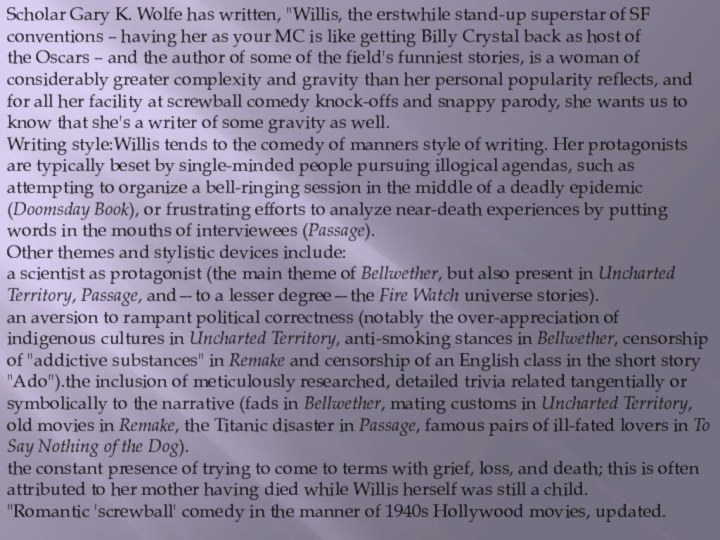
superstar of SF conventions – having her as your MC is
like getting Billy Crystal back as host of the Oscars – and the author of some of the field's funniest stories, is a woman of considerably greater complexity and gravity than her personal popularity reflects, and for all her facility at screwball comedy knock-offs and snappy parody, she wants us to know that she's a writer of some gravity as well.
Writing style:Willis tends to the comedy of manners style of writing. Her protagonists are typically beset by single-minded people pursuing illogical agendas, such as attempting to organize a bell-ringing session in the middle of a deadly epidemic (Doomsday Book), or frustrating efforts to analyze near-death experiences by putting words in the mouths of interviewees (Passage).
Other themes and stylistic devices include:
a scientist as protagonist (the main theme of Bellwether, but also present in Uncharted Territory, Passage, and—to a lesser degree—the Fire Watch universe stories).
an aversion to rampant political correctness (notably the over-appreciation of indigenous cultures in Uncharted Territory, anti-smoking stances in Bellwether, censorship of "addictive substances" in Remake and censorship of an English class in the short story "Ado").the inclusion of meticulously researched, detailed trivia related tangentially or symbolically to the narrative (fads in Bellwether, mating customs in Uncharted Territory, old movies in Remake, the Titanic disaster in Passage, famous pairs of ill-fated lovers in To Say Nothing of the Dog).
the constant presence of trying to come to terms with grief, loss, and death; this is often attributed to her mother having died while Willis herself was still a child.
"Romantic 'screwball' comedy in the manner of 1940s Hollywood movies, updated.
Слайд 25
Willis is acclaimed as a science-fiction writer, with
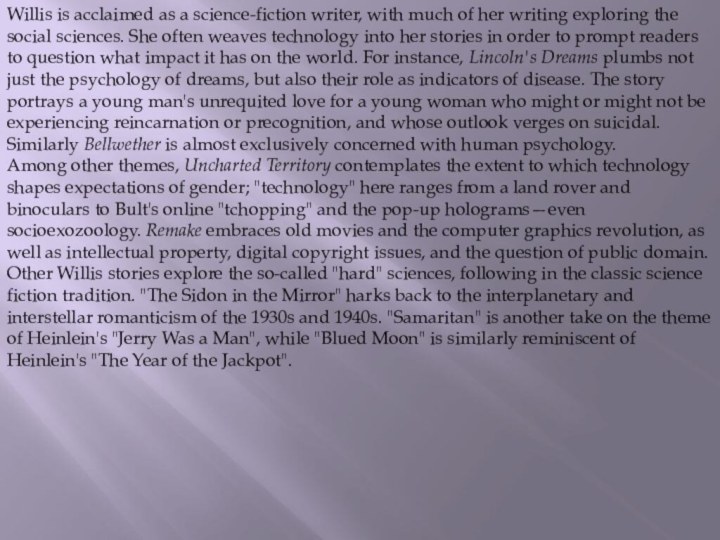
much of her writing exploring the social sciences. She
often weaves technology into her stories in order to prompt readers to question what impact it has on the world. For instance, Lincoln's Dreams plumbs not just the psychology of dreams, but also their role as indicators of disease. The story portrays a young man's unrequited love for a young woman who might or might not be experiencing reincarnation or precognition, and whose outlook verges on suicidal. Similarly Bellwether is almost exclusively concerned with human psychology.
Among other themes, Uncharted Territory contemplates the extent to which technology shapes expectations of gender; "technology" here ranges from a land rover and binoculars to Bult's online "tchopping" and the pop-up holograms—even socioexozoology. Remake embraces old movies and the computer graphics revolution, as well as intellectual property, digital copyright issues, and the question of public domain.
Other Willis stories explore the so-called "hard" sciences, following in the classic science fiction tradition. "The Sidon in the Mirror" harks back to the interplanetary and interstellar romanticism of the 1930s and 1940s. "Samaritan" is another take on the theme of Heinlein's "Jerry Was a Man", while "Blued Moon" is similarly reminiscent of Heinlein's "The Year of the Jackpot".
Слайд 27
William Somerset Maugham 25 January 1874 – 16 December

1965) was a British playwright, novelist and short story writer. He was among the
most popular writers of his era and reputedly the highest paid author during the 1930s.
After losing both his parents by the age of 10, Maugham was raised by a paternal uncle who was emotionally cold. Not wanting to become a lawyer like other men in his family, Maugham eventually trained and qualified as a medical doctor (physician). The first run of his first novel, Liza of Lambeth (1897), sold out so rapidly that Maugham gave up medicine to write full-time.
During the First World War, he served with the Red Cross and in the ambulance corps, before being recruited in 1916 into the BritishSecret Intelligence Service, for which he worked in Switzerland and Russia before the October Revolution of 1917. During and after the war, he travelled in India and Southeast Asia; all of these experiences were reflected in later short stories and novels.
Childhood and education.
Maugham's father, Robert Ormond Maugham, was a lawyer who handled the legal affairs of the British embassy in Paris. Since French law declared that all children born on French soil could be conscripted for military service, his father arranged for Maugham to be born at the embassy, technically on British soil. His grandfather, another Robert, had also been a prominent lawyer and co-founder of the English Law Society. It was taken for granted that Maugham and his brothers would follow in their footsteps. His elder brotherViscount Maugham enjoyed a distinguished legal career and served as Lord Chancellor from 1938 to 1939.
Maugham's mother, Edith Mary (née Snell), had tuberculosis (TB), a condition for which her medic prescribed childbirthю.
Слайд 28
Edith's sixth and final son died on 25
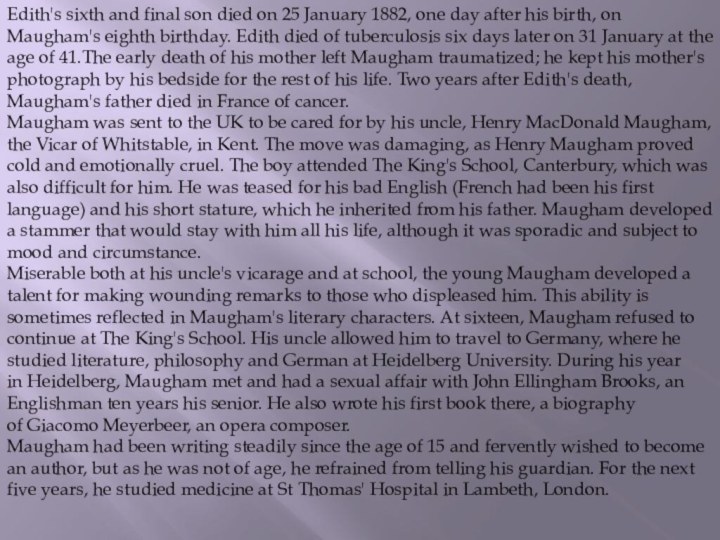
January 1882, one day after his birth, on Maugham's
eighth birthday. Edith died of tuberculosis six days later on 31 January at the age of 41.The early death of his mother left Maugham traumatized; he kept his mother's photograph by his bedside for the rest of his life. Two years after Edith's death, Maugham's father died in France of cancer.
Maugham was sent to the UK to be cared for by his uncle, Henry MacDonald Maugham, the Vicar of Whitstable, in Kent. The move was damaging, as Henry Maugham proved cold and emotionally cruel. The boy attended The King's School, Canterbury, which was also difficult for him. He was teased for his bad English (French had been his first language) and his short stature, which he inherited from his father. Maugham developed a stammer that would stay with him all his life, although it was sporadic and subject to mood and circumstance.
Miserable both at his uncle's vicarage and at school, the young Maugham developed a talent for making wounding remarks to those who displeased him. This ability is sometimes reflected in Maugham's literary characters. At sixteen, Maugham refused to continue at The King's School. His uncle allowed him to travel to Germany, where he studied literature, philosophy and German at Heidelberg University. During his year in Heidelberg, Maugham met and had a sexual affair with John Ellingham Brooks, an Englishman ten years his senior. He also wrote his first book there, a biography of Giacomo Meyerbeer, an opera composer.
Maugham had been writing steadily since the age of 15 and fervently wished to become an author, but as he was not of age, he refrained from telling his guardian. For the next five years, he studied medicine at St Thomas' Hospital in Lambeth, London.
Слайд 29
Early works
Some critics have assumed that the years
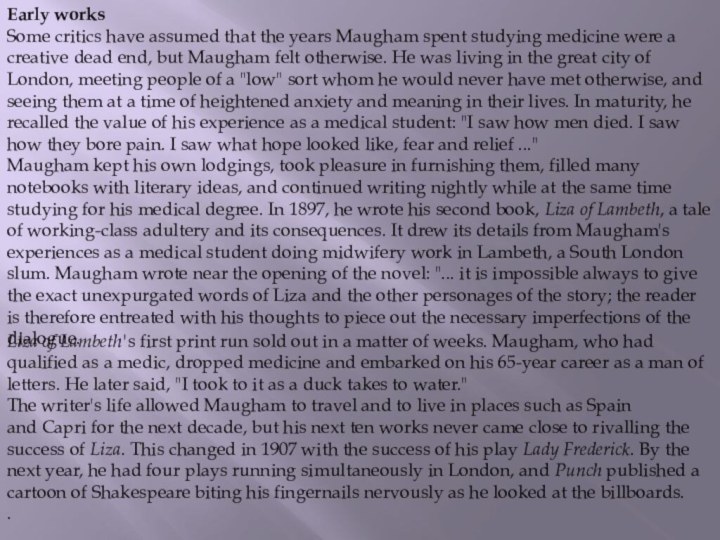
Maugham spent studying medicine were a creative dead end,
but Maugham felt otherwise. He was living in the great city of London, meeting people of a "low" sort whom he would never have met otherwise, and seeing them at a time of heightened anxiety and meaning in their lives. In maturity, he recalled the value of his experience as a medical student: "I saw how men died. I saw how they bore pain. I saw what hope looked like, fear and relief ..."
Maugham kept his own lodgings, took pleasure in furnishing them, filled many notebooks with literary ideas, and continued writing nightly while at the same time studying for his medical degree. In 1897, he wrote his second book, Liza of Lambeth, a tale of working-class adultery and its consequences. It drew its details from Maugham's experiences as a medical student doing midwifery work in Lambeth, a South London slum. Maugham wrote near the opening of the novel: "... it is impossible always to give the exact unexpurgated words of Liza and the other personages of the story; the reader is therefore entreated with his thoughts to piece out the necessary imperfections of the dialogue.
Liza of Lambeth's first print run sold out in a matter of weeks. Maugham, who had qualified as a medic, dropped medicine and embarked on his 65-year career as a man of letters. He later said, "I took to it as a duck takes to water."
The writer's life allowed Maugham to travel and to live in places such as Spain and Capri for the next decade, but his next ten works never came close to rivalling the success of Liza. This changed in 1907 with the success of his play Lady Frederick. By the next year, he had four plays running simultaneously in London, and Punch published a cartoon of Shakespeare biting his fingernails nervously as he looked at the billboards.
.
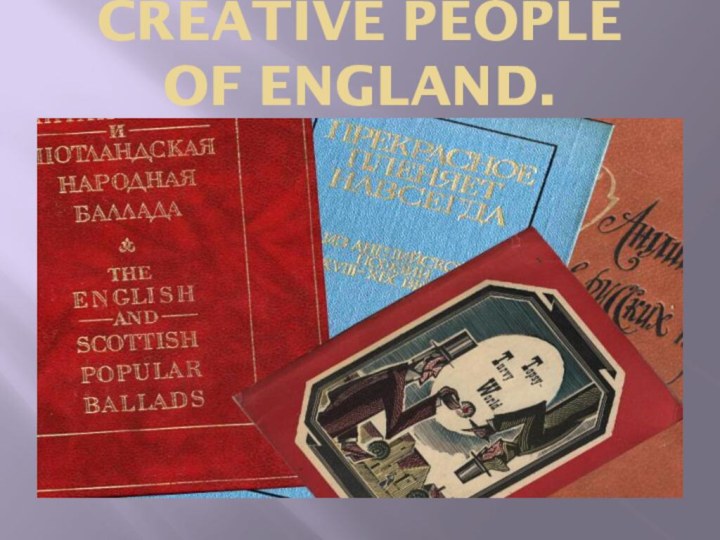





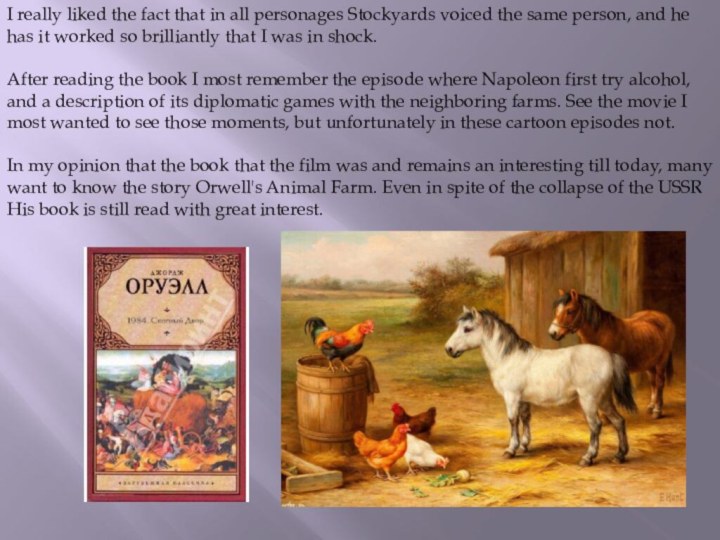
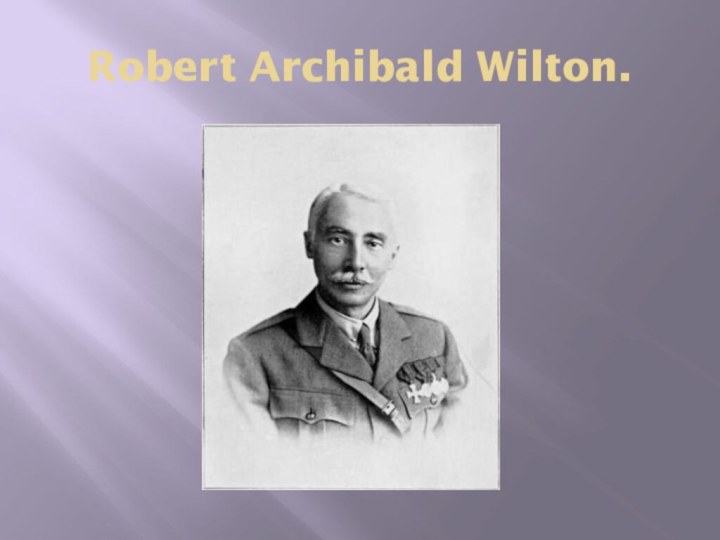

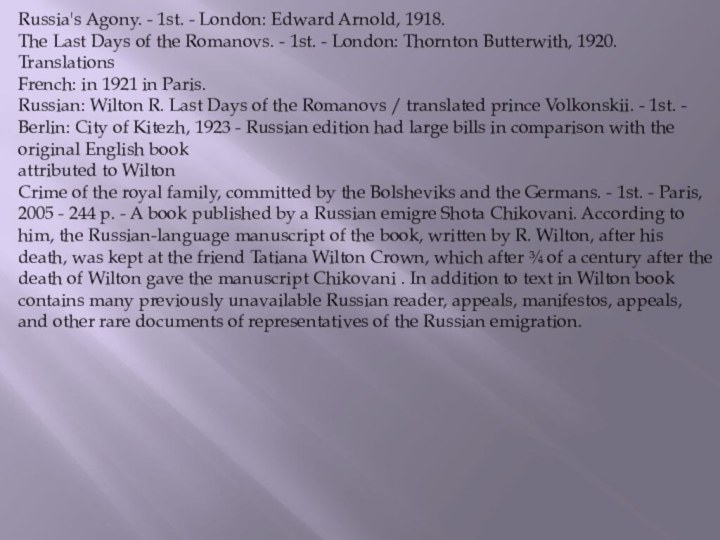


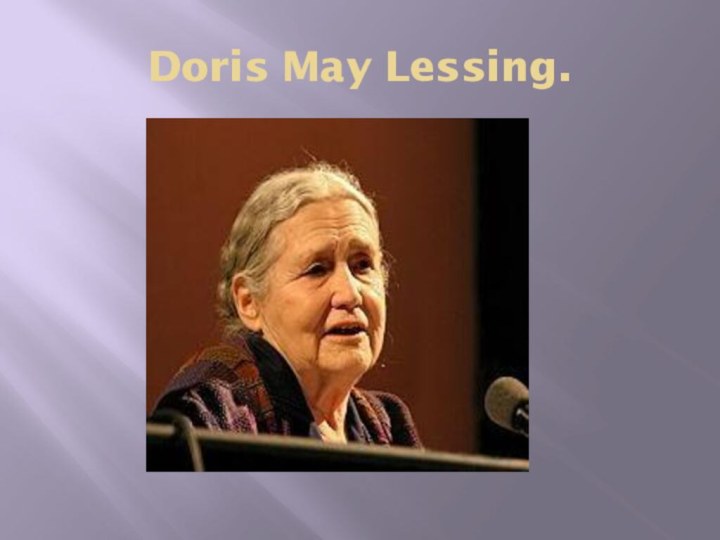
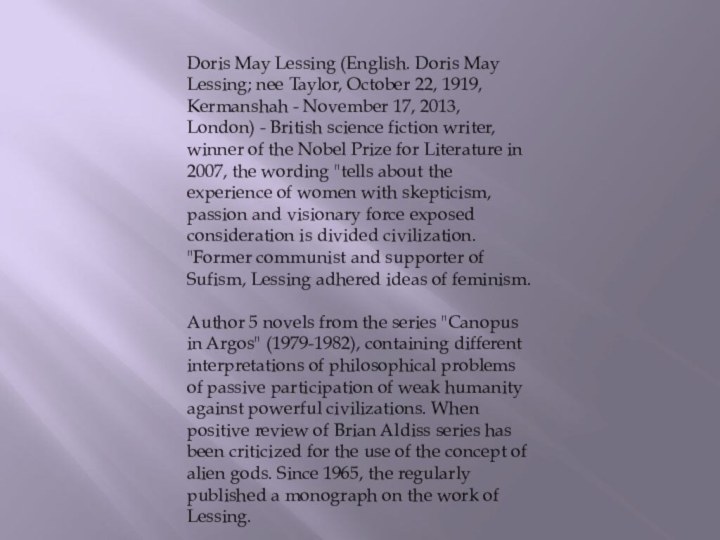


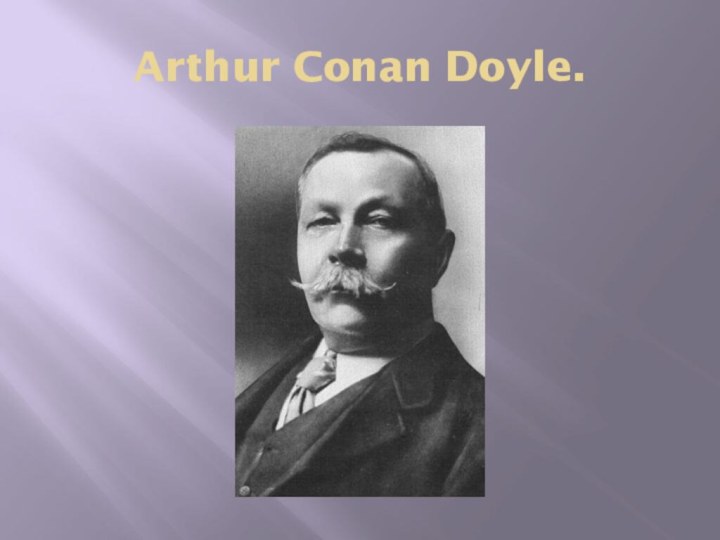
![Презентация по английскому языку на тему: CREATIVE PEOPLE OF ENGLAND Sir Arthur Igneyshus (in outdated transmission - Ignatius) [2] Conan Doyle [3]](/img/tmb/7/602191/0b26ba1c3ced976b369370aa59e42a98-720x.jpg)



